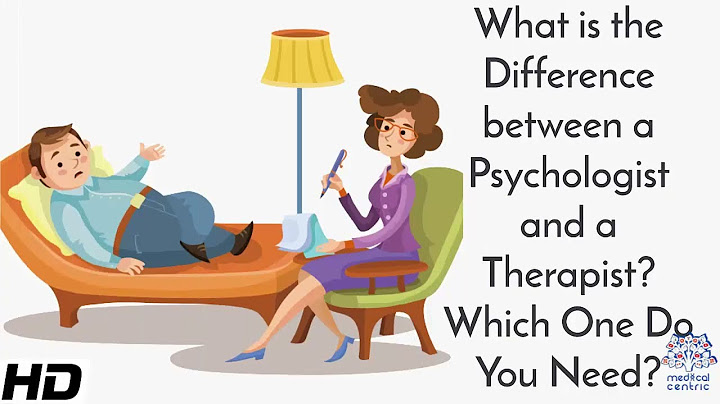The three main differences between psychiatrists and psychologists are: Show
Many people get psychiatrists and psychologists confused with each other. Both psychiatrists and psychologists understand how the brain works, our emotions, feelings and thoughts. Both can treat mental illness with psychological treatments (talking therapies). However, psychiatrists attend medical school and become medical doctors before doing specialist training in mental health. Because they are doctors, psychiatrists understand the links between mental and physical problems. They can also prescribe medications. To go into it in some more detail, the main differences relate to:
TrainingPsychiatrists are medical doctors with at least 11 years of training – usually more. They first do a medical degree at university. Next they spend at least 1 or 2 years training as a general doctor. They then complete at least 5 years training in the diagnosis and treatment of mental illness. Psychologists have at least 6 years of university training and supervised experience. They may also hold a Masters or Doctorate level qualification in psychology. If they have a Doctorate (PhD) a psychologist can call themselves ‘Dr’, but they are not medical doctors. Clinical psychologists have special training in the diagnosis and treatment of mental illness. Treatments providedPsychiatrists can provide a wide range of treatments, according to the particular problem and what will work best. These include:
Psychologists focus on providing psychological treatments. Conditions treatedPsychiatrists tend to treat people who need their medical, psychological and social needs considered. These are usually people with complex conditions, for example:
Someone who has attempted suicide or has suicidal thoughts will usually be seen by a psychiatrist. Psychologists are more likely to see people with conditions that can be helped effectively with psychological treatments. This might include behavioural problems, learning difficulties, depression and anxiety. Getting an appointmentAs with all medical specialists, to see a psychiatrist you need a referral from your GP (family doctor). To see a psychologist you don’t need a referral. However, in Australia a GP can refer you to a psychologist as part of a Mental Health Treatment Plan. There are around 4000 psychiatrists working across Australia and New Zealand, while there are about 27,000 registered psychologists. Working togetherPsychiatrists and psychologists often work together. A psychiatrist might make an initial assessment and diagnosis, then refer you to a psychologist for ongoing psychological treatment (talking therapy). Psychiatrists and psychologists also work together in hospitals as part of mental health teams. Who should I see?If you are unsure whether you should see a psychiatrist or a psychologist, talk to your GP. They can give you advice about whether a psychiatrist or a psychologist is right for you. It will depend on your unique situation and the type of treatment you need. Some people might see both. More about first steps to get help More about psychiatrists According to the National Institute of Mental Health, mental illness affects millions of Americans, but only about half of those affected get treatment. If you are experiencing mental health issues, when should you get help? And what type of help is right for you? Psychologist, psychiatrist or therapist: What’s the difference?Psychiatrists are medical doctors and have medical training specializing in mental illness. Psychiatrists can write prescriptions and may offer psychotherapy, or talk therapy, to their patients. Psychologists usually have a doctoral degree, or a Ph.D., in Clinical or Counseling Psychology. They can also treat patients using psychotherapy and are trained in making psychiatric diagnoses. Psychologists can work in clinical, research or educational fields. Unlike psychiatrists, psychologists do not prescribe medication. However, psychologists work closely with psychiatrists if medication is needed when treating a patient. "Therapist" is a broader term used for those who are trained and licensed in a variety of fields to help people. Therapists can be:
Though there are many professionals who claim to be therapists, it’s a good idea to find someone who is accredited and licensed to work in their field. If you are looking for a mental health professional, talk to your doctor about what type of therapy is right for you. When should I seek help for mental health issues?There are many different mental health issues, and they can affect people differently. If you are concerned about changes in your mental health or are experiencing any of the following symptoms, get help right away. Warning signs of mental illness include:
Is online therapy right for me?With the COVID-19 pandemic, many are choosing to do online therapy and many doctors now offer sessions online or over the phone. Some of the benefits of online, or E therapy, include:
Some of the downfalls of online therapy include:
How to talk to your doctor about mental illnessIf you’re concerned about your mental health, talk to your doctor. These tips can make the conversation easier, so you can get the help you need:
What is the difference between a counselor and a psychiatrist?A therapist is a licensed counselor or psychologist who can use talk therapy to help you treat mental health symptoms and improve how you manage stress and relationships. A psychiatrist is a medical doctor who can diagnose and prescribe medication to treat mental health disorders.
What is the difference between a therapist and a counselor?Therapists work to help their patients address similar issues, and often provide the same advice that counselors might. However, a key difference is that therapists often seek to go deeper by helping the patient understand the how and why behind a challenge.
|

Advertising
LATEST NEWS
Advertising
Populer
Advertising
About

Copyright © 2024 boxhindi Inc.










